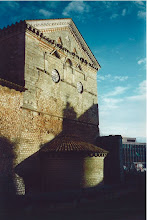Treasures of "Western" Orthodoxy

This is the Bapistery of Saint John (Baptistere St. Jean) in Poitiers, France. The photo is copyright me, shot in 1996 . . . please feel free to make 'fair use' of it, but don't start selling postcards using the shot, etc. :)
The Baptistery was originally built in the 4th Century, when Poitiers was a Roman town in Gaul, known as Pictaviensis. St. Hilary of Poitiers was its bishop then. He was one of the Latin fathers to battle the Arian heresy, and to explain the problem to the Latin-speaking bishops and presbyters 'round about. He had the advantage of having been exiled by the Emperor to the east, and picking up quite a few things about what was going on (and probably improving his Greek a great deal, too). The Roman Catholic Church has declared him a Doctor of the Church - there aren't too many of those, and you can look up what it means in the Catholic Encylopedia on line.
The building was not a regular parish church, but particularly reserved for immersion baptisms, with the altar on the far side of the baptismal pool for that first communion. A few modifications to the original building were made, but basically that ended in about the 7th or 8th century and ultimately the thing fell out of use somewhere in the 9th century as a baptistery since the sprinkling of infants was on the rise in the West.
So this building out in West Central France is quite an old treasure . . . older than the Hagia Sophia in Istanbul, I think, and older than St. Catherine's monastery in Sinai. It's the oldest Christian building in all of France that's still around (according to the museum there). Go visit if you get a chance, before it falls down or something.
St. Hilary wrote a nice treatise entitled "On the Holy Trinity" which is respected East and West. The first three chapters (or 'books') are a delightful exposition of the basic trinitarian belief, and how St. Hilary came to that understanding from a pagan upbringing.
St. Hilary, and the bapistery that he served at, reminds us that Orthodoxy is neither 'Eastern' nor 'Western' but is the heritage of both.


3 Comments:
Oh my goodness, what a wonderful entry, and a great history lesson. I've not read St. Hilary's treatsie but I look forward to picking it up (at Powell's maybe)
It's available as a pdf or on-line read from ccel.org in the Nicene and Post-Nicene Fathers, although now ccel requires you to register (it's free) in order to download their pdfs.
Here's the webpage:
http://www.ccel.org/ccel/schaff/npnf209.html
Oooh, thanks for the link. I *may* be registered with CCEL, I've definitely read the site before.
Post a Comment
<< Home